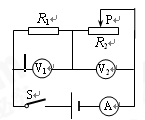在图所示的电路中,电源电压保持不变,R1为定值电阻。闭合电键S,当滑动变阻器的滑片P向右移动时,电压表V2的示数将 ;电压表V1示数与电流表A示数的比值将 。(均选填“变大”、“不变”或“变小”)
变大; 不变
:(1)由电路图知:电阻R1与R2串联,电压表V1测电阻R1的电压,电压表V2测电阻R2的电压,电流表A测电路电流;
(2)当滑动变阻器的滑片P向右移动时,滑动变阻器接入电路的电阻变大,电路总电阻R变大;
(3)电源电压U不变,电路总电阻R变大,则电路电流I= 变小,电阻R1阻值不变,则它两端的电压U1=IR1变小,电阻R2两端的电压U2=U-U1变大,则电压表V2的示数将变大.
变小,电阻R1阻值不变,则它两端的电压U1=IR1变小,电阻R2两端的电压U2=U-U1变大,则电压表V2的示数将变大.
(4)由于电阻R1阻值不变,由R1= 知,电压表V1示数与电流表A示数的比值将不变.
知,电压表V1示数与电流表A示数的比值将不变.
故答案为:变大;不变.
